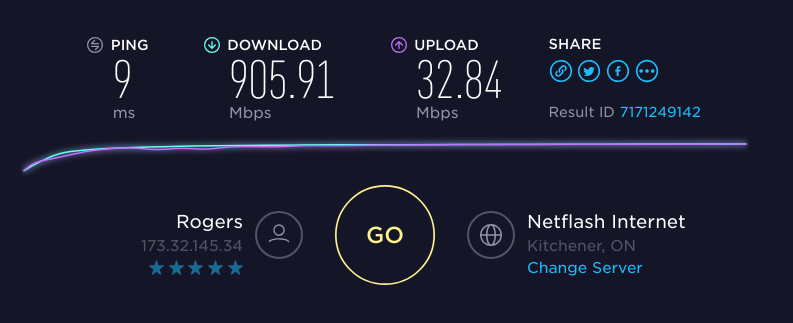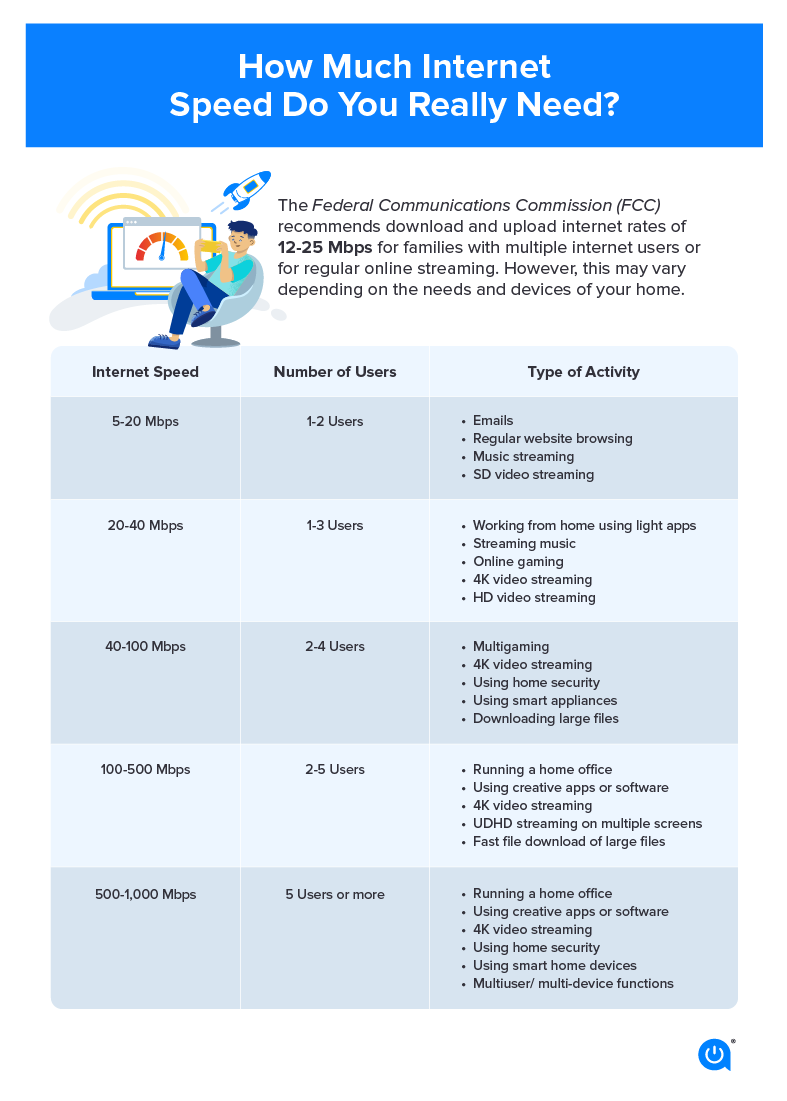Why Megabits Per Second Make A Difference for Remote Work Effectiveness
Why Megabits Per Second Make A Difference for Remote Work Effectiveness
Blog Article
How Megabits Per Second Impact Your Online Activities
The idea of megabits per second (Mbps) plays an essential duty in forming our on-line experiences. As electronic tasks multiply, recognizing the implications of Mbps on video clip, streaming, and pc gaming conferencing comes to be significantly crucial. Greater Mbps can improve efficiency and reduce disruptions, while insufficient rates may cultivate disappointment and inefficiency. Examining your house's particular demands in connection with these speeds is necessary, particularly as several devices contend for transmission capacity. The nuances of exactly how Mbps affects numerous online activities warrant additional exploration, specifically as our reliance on electronic connection proceeds to evolve.
Comprehending Megabits Per Second
When considering web speed, it's vital to recognize the idea of megabits per second (Mbps), which works as a standard measurement for data transfer rates. This metric measures exactly how much information can be transferred over a net link in one second, supplying a clear understanding of performance capacities - Megabits Per Second. For context, one megabit is equivalent to one million bits, and Mbps is frequently utilized to reveal bandwidth for various on the internet tasks
A higher Mbps shows a quicker internet link, allowing customers to execute tasks such as downloading and install documents, surfing websites, and taking part in online gaming much more successfully. For example, regular browsing needs around 1-5 Mbps, while streaming high-def video might demand 5-25 Mbps. Comprehending these demands is essential for identifying the suitable internet rate needed for specific activities.
In addition, the number of devices attached to a network can impact total efficiency. Multiple users streaming, pc gaming, or downloading and install at the same time can stress readily available transmission capacity, leading to slower speeds - Megabits Per Second. Reviewing individual online routines and demands is crucial in selecting a net strategy that lines up with one's needs, making sure a seamless electronic experience
Streaming and Buffering Issues
Streaming high-def content has actually come to be a staple of modern on the internet entertainment, yet it is typically come with by annoying buffering issues. These interruptions can considerably interfere with the seeing experience, bring about dissatisfaction and prospective loss of target market engagement. Buffering occurs when the information sent from the streaming service is not received promptly sufficient to maintain a smooth playback, often as a result of inadequate internet speed determined in megabits per second (Mbps)

Additionally, real-time streaming can be impacted by network congestion, which occurs when numerous tools share the exact same data transfer. Maximizing link speed and making certain ample Mbps is necessary for a seamless streaming experience. As streaming solutions proceed to develop, comprehending the impact of Mbps on buffering concerns stays crucial for customers looking for continuous home entertainment.
Online Gaming Efficiency
The effect of web speed on on-line activities extends past streaming, substantially influencing on-line video gaming performance. In affordable video gaming, low latency and high bandwidth are important for a seamless experience. A quick link minimizes lag, allowing players to respond quickly to in-game events, which can be the distinction in between success and loss.
Bandwidth, measured in megabits per second (Mbps), plays a vital function in sustaining multiple gadgets and pc gaming platforms simultaneously. Inadequate transmission capacity can result in went down links or decreased video game top quality, negatively impacting gameplay. On-line multiplayer games need significant information transfer, particularly during peak video gaming hours when countless gamers are online.
Fast-paced first-person shooters demand greater rates to preserve responsiveness, while turn-based technique games may function moderately well on reduced rates. As on the internet pc gaming continues to evolve, with increasing visual integrity and even more intricate multiplayer environments, the need for over at this website greater Mbps will only escalate.
Video Conferencing Quality
In today's digital landscape, video conferencing high quality is greatly affected by internet rate, specifically in regards to bandwidth and latency. Top quality video clip calls require sufficient transmission capacity to transmit sound and video clip data flawlessly. Usually, a minimum of 1.5 Mbps upload and download speeds is recommended for standard meaning video, while high-def video conferencing generally requires at the very least 3 Mbps.
Latency, or the delay in between sending and obtaining data, likewise plays a critical function in the customer experience. Greater latency can lead to echo, lag, and disjointed communications, which can hinder partnership and involvement during meetings.
Moreover, several participants in a video seminar can stress available data transfer, demanding also higher speeds. Network blockage, often created by synchronised tasks like streaming or downloading, can further deteriorate video high quality. Therefore, for companies depending on video clip conferencing for remote cooperation, comprehending the partnership between megabits per total and second interaction quality is necessary for maintaining efficiency and improving online communications.
Selecting the Right Web Plan
Selecting an ideal net plan is crucial for making sure ideal efficiency in numerous on-line tasks, especially in settings that demand high data transfer, such as video conferencing and online pc gaming. Megabits Per Second. When thinking about an internet strategy, it is vital to review both the speed and information allowance to match your details use demands
For houses with multiple individuals involving in simultaneous activities, a strategy offering greater megabits per second (Mbps) is recommended. Usually, a minimum of 25 Mbps is appropriate for standard streaming and browsing, while strategies surpassing 100 Mbps are more effective for even more intensive jobs. In addition, consider the nature of your online activities; video conferencing requires at least 1.5 Mbps upload rate, while on-line pc gaming may require a lower latency but constant connection.
It is additionally crucial to assess your information cap. Unrestricted data strategies can avoid strangling and disruptions, especially if heavy use is expected. Research solution carriers in your area, as availability and pricing can differ. By attentively picking a web strategy tailored to your needs, you can improve your on-line experience, making sure smooth, nonstop accessibility to your favored tasks.
Conclusion
To conclude, the value of megabits per second (Mbps) in forming online tasks can not be overstated. Greater Mbps assists in smooth streaming, decreases buffering, enhances gaming experiences, and makes certain premium video conferencing. On the other hand, poor transmission capacity can result in frustrating interruptions and decreased performance across different tasks. A complete understanding of private or home Mbps requirements is crucial for choosing a suitable internet strategy that sufficiently supports varied online tasks and user needs.

Commonly, a minimum of 25 Mbps is ideal for typical streaming and surfing, while plans exceeding 100 Mbps are Source more suitable for even more extensive tasks. Additionally, consider the nature of your online tasks; video clip conferencing needs at least 1.5 Mbps post rate, while on the internet gaming might need a lower latency yet constant connection.
Report this page